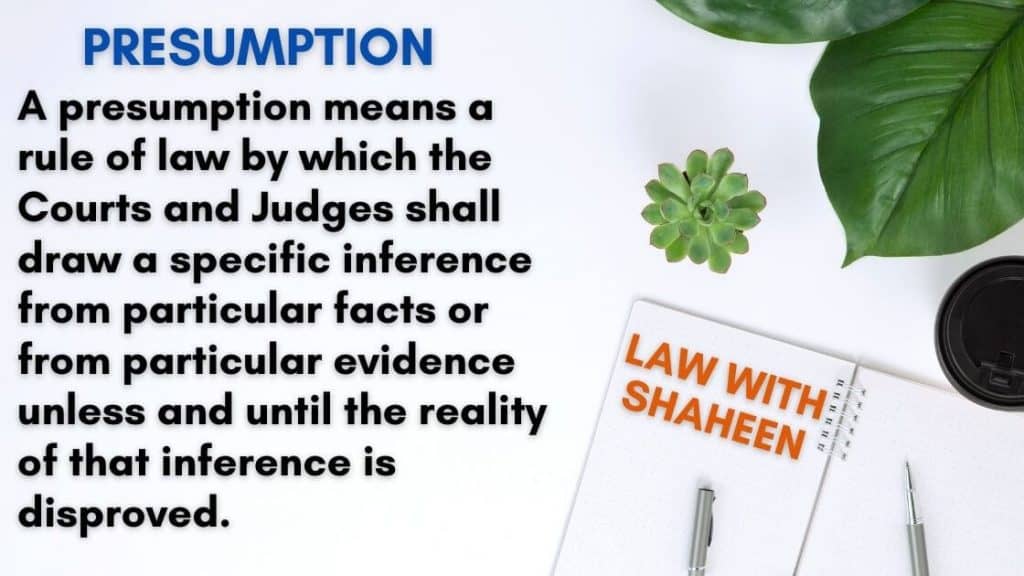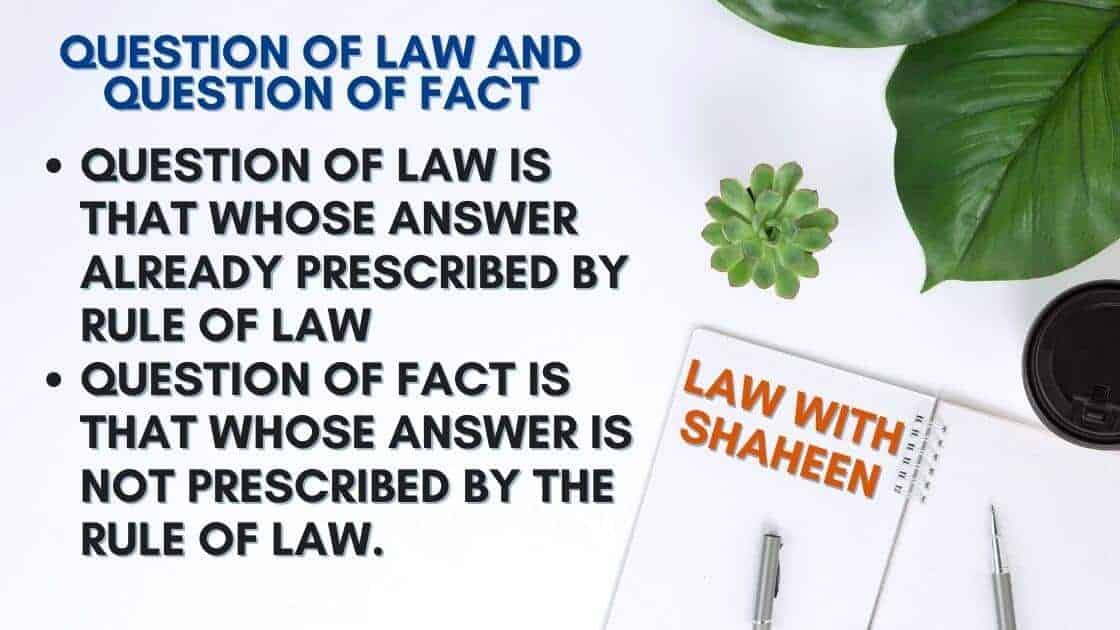Questions that arise for determination before a Court of law are considered either questions of law or questions of facts or a mixture of both, known as mixed questions of law and fact.
Table of Contents
Question of Law:
We can understand a question of law in three senses:
First Sense:
A question whose answer is already prescribed by some rule of law. Thus, the question as to what is the reasonable and proper punishment for murder is a question of law.
In such cases, the judicial opinion is excluded and the discretion of the Judge is ruled out.
Second Sense:
The question as to what law on a particular point is. Such questions arise where notwithstanding the existence of a law on the point, it is dubbed with uncertainty.
Such a state of affairs may be a matter of common occurrence because the language of the statute is often capable of assorted interpretations. And it is during this sphere that lawyers play the foremost important role.
So, the interpretation of a specific provision of the law could be a question of law during this second sense but once it has been interpreted either way by a superior Court it becomes a question of law within the first sense.
Third Sense:
In Jury trials, such questions as are to be answered by the Judge have named questions of law as distinguished from those which are to be answered by the Jury and which are called questions of fact.
This classification of the definition of a question of law is, however, incorrect because the Judge may often determine a question of fact ALSO but for that mere reason, such a question would not turn out to be a question of law.
For instance, A child under seven years of age does not have sufficient mental capacity to understand the nature of the consequences of the act done by him. This rule is prescribed by law, that a child under seven years of age is incapable of committing a crime. The courts, therefore, have no option but to answer the question of the criminal capacity of such a child in the negative.
Question of Fact:
A question of fact means a question apart from a question of law. Thus,
i). any question not answered by a fixed rule of law;
ii). Any question is other than what the law on a particular point is;
iii). Any question that is to be decided by the Jury and not by the Judge is a question of fact.
Regarding the distinction between the question of law and fact, Patton observes:
“However difficult it may be to define the exact difference between law and fact, the distinction itself is fundamental for any legal system. Law consists of abstract rules which attempt to reduce to order the teeming facts of life. Facts are the raw material on the basis of which the law creates certain rights and duties”.
Patton
According to Salmond, all matters and questions that come before a court of justice are of three kinds viz., matters and questions of law, matters and questions of judicial discretion, and matters and questions of fact.
In the first case, it is the duty of the court to ascertain the law and decide the case accordingly. Next, In the second case, the court can exercise its own judgment and decide the dispute according to what it considers to be right, just, equitable, or reasonable.
In the third case, it is the duty of the court to weigh the evidence and then come to its conclusion.
For instance, whether a child is under seven years of age or not, is a question of fact. And whether he can be tried for an offense, is a question of law.
What punishment, within the prescribed maximum limit, should be awarded to an accused in a particular case, is a pure question of fact. And what punishment is provided in law for that offense would be a question of law.
Mixed Questions of Fact and Law:
Some questions may be part of the law and partly of fact. Thus, in partnership cases, questions may arise necessitating the determination of the: –
i). the basic relation between the parties (a question of fact);
ii). The question of whether the relationship so proved constitutes a legal partnership (a question of law).
Presumption:

A presumption means a rule of law by which the Courts and Judges shall draw a specific inference from particular facts or from particular evidence unless and until the reality of that inference is disproved.
Thus, an individual who has not been heard from for seven years is presumed to be dead, although, in an exceeding number of actual cases, he has been found alive.
Similarly, an accused person is presumed to be innocent as long as he is not conclusively proven to have committed the offense. Although the accused is a very influential person who may have suppressed all evidence and none have the courage to come forward to speak against him.
The presumption may be either of fact or of law.
Presumption of law again is either rebuttable or conclusive:
Rebuttable:
Rebuttable presumptions are such as can be drawn by the Court if sufficient evidence is given to satisfy the Court that the inference drawn by it is incorrect.
Conclusive:
Conclusive presumptions are those where on proof of one fact, the Court shall regard the other to have been actually proved and no evidence shall be admissible to contradict it.
In this sense, a child born during the continuance of a marriage or within 280 days of its dissolution shall be conclusively presumed to be legitimate.
The conclusion is that the Question of law and the Question of fact is different. The question of law is whose answer is already prescribed by the rule of law while the Question of fact is whose answer is not prescribed by the rule of law.
Frequently Asked Questions (FAQs)
A question of law is a question that can be answered by reference to the law, without any need for factual evidence. A question of fact is a question that can only be answered by looking at the evidence.
Questions of fact are those that can be answered definitively, usually through research or experimentation. They are as opposed to questions of opinion, which cannot be answered as definitively.
Questions of fact are the bread and butter of lawyers everywhere. Without them, we’d be out of a job.
The question of opinion in law is a fundamental concept that demands exploration and elucidation. It refers to expressions of belief regarding the application of legal principles which are not necessarily based on empirical evidence. As such, it is an important factor in the determination of legal disputes since it can affect the outcome of a case.
